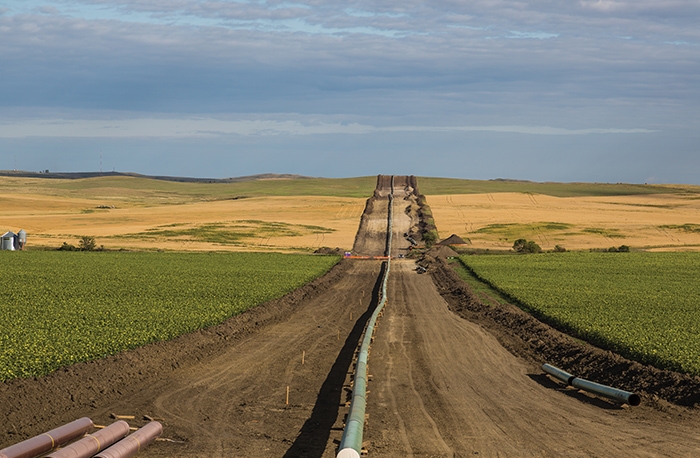Lack of pipelines costing Canada, say economists
March 3, 2018, 2:34 am
Kevin Weedmark


Lack of pipelines and massive discounts for Canadian heavy oil could cost the economy $15.6 billion this year, or three-fourths of a point from the country’s GDP, according to economists at Scotiabank.
Shannon Stubbs, the Conservative Shadow Minister for Natural Resources told the World-Spectator Friday that changes in the pipeline approval process by the federal Liberal government will make it much more difficult for future pipeline projects to be approved.
The Scotiabank economists said the damage to the economy is real and can be measured.
“Reliance on the existing pipeline network and rail shipments to bring Canadian oil to market has a demonstrable impact on Canada’s well-being, with consequences that extend well beyond Alberta,” Scotiabank senior vice-president and chief economist Jean-Francois Perrault and commodity economist Rory Johnston wrote in a report released Tuesday.
The economists said the current US $24 per barrel discount between Western Canada Select and West Texas Intermediate oil prices erase $15.6 billion from the economy this year, or around 0.75 per cent of the country’s GDP.
They note, however, that as more and more oil moves out of Canada on railway cars to make up for the lack of pipeline capacity, the discount between WCS and WTI should shrink to an average of US $21.60 per barrel. This would reduce the cost to the Canadian economy to roughly $10.8 billion this year, or 0.5 per cent of GDP, and $7 billion next year, or an estimated 0.3 per cent of GDP.
Scotiabank called the delay of new export pipelines and the large discounts that it has triggered, “a self-inflicted wound.”
“The sooner governments move to allow additional pipeline capacity to be built, the better off Canada will be,” Scotiabank economists Perrault and Johnston wrote.
Kinder Morgan Canada’s $7.4-billion Trans Mountain expansion, TransCanada Corp.’s US $8-billion Keystone XL, and Enbridge Inc.’s $8.2-billion Line 3 replacement project are the three major export pipelines that could shrink the discount considerably, the bank said.
While all three have been approved by the Canadian government, they remain mired in court challenges from environmental groups or local communities, and have delayed their anticipated in-service dates. Line 3 is also awaiting approval from regulators in Minnesota.
A judge in Minnesota delayed a decision on the Minnesota portion. That decision could now come as late as this June. While work started on the western three spreads and pipe is stockpiled at sites such as Fairlight awaiting the project to move forward, contracts have not yet been let for the eastern six pipeline spreads across the Prairies.
Conservative shadow minister for Natural Resources Shannon Stubbs told the World-Spectator Friday she wasn’t surprised by the impact reported in the Scotiabank report.
“It is the latest in the number of reports that have come out in the past couple of years highlighting how important both energy development itself is, but also how important pipeline capacity is to the economy,” she said. “The very first speech I gave in the House of Commons was to a motion to support the Energy East pipeline, and in 2016 I tabled an E-petition. At that time—it has since been surpassed—but at that time it was the most signed E-petition ever in support of pipelines as crucial economic infrastructure and urging the federal Liberals to make it a priority to establish pipeline infrastructure in all directions to diversify Canada’s export markets.
“It is a crucial issue for the Canadian economy. One of the things I’ve worked really hard on over the last couple of years is to get across to the federal Liberals that it’s not just the downturn in the energy sector and the benefits of energy development are not just isolated to say Alberta or Saskatchewan—it’s not just a western or a prairie thing but very much underpins the entire Canadian economy, because energy is Canada’s number one private sector investor in the economy and it’s Canada second biggest export. This is yet more confirmation about just how important the energy industry is to the whole country and a reminder of the urgent need to increase pipeline capacity and to build new pipelines to tidewater.” (See next week’s World-Spectator for the full, extensive interview with Shannon Stubbs)
Enbridge president and CEO Al Monaco said last week that surging oil production and limited pipeline capacity means the Line 3 project will be completely full when it is finished construction in 2019, if the regulators approve the project by the second quarter.
Separate from the approved pipelines, the Canadian federal government has also recently unveiled a new review process for pipelines, which could complicate future assessments of new projects, according to analysts.
The new process will include a review of items such as whether a pipeline will have an impact on climate change goals, which was not previously considered under the previous regulatory regime, as well as a gender-based analysis of impacts of major energy and mining projects.
“The broader scope of the assessment list of factors to consider will complicate the federal assessment, which will add cost and effort on project developers,” partners from law firm Bennett Jones LLP wrote in a note Tuesday.
Analysts expect wider discounts to persist until either the Trans Mountain or Keystone XL projects are built in late 2020 or 2021.
The discount Canadian oil producers face for their product has grown substantially since Calgary-based pipeline TransCanada detected a spill on its existing 590,000-bpd Keystone pipeline in South Dakota in November. A lack of space on other pipelines has led to 600,000 bpd build up in oil storage within Alberta.
Souris-Moose Mountain MP Dr. Robert Kitchen told the World-Spectator that lack of leadership by the federal government is the issue.
“A lot of it is lack of leadership,” he said. “This is a federal issue. With Kinder Morgan it’s the same thing they did with Energy East—they kicked it down the road and they kept putting it off, putting it off until finally the proponent decided it wasn’t worth their while and decided not to follow through with it. That is what I see them doing here with the Trans Mountain.
“They are doing exactly the same thing to Kinder Morgan. The Prime Minister needs to stand up to B.C. and say this is needed. When you look at the impact and put it into perspective, $15.6 billion is a school or hospital for many, many communities around the country paid for, and that’s lost.”
How would a Conservative government approach the issue differently?
“If we have a Conservative government after the next election, I hope we will see the proponent reapply for energy that is an important aspect to it. The Conservative Party recognizes the need for those pipelines and the value that they produce for this country. Pipelines are good for the economy and for the country. Oil and natural gas are resources that we have a lot of, especially in this riding. We need to move that to market.”
Kitchen said he can’t see anything changing under the current government.
“I don’t see them making any changes,” he said. “I think they will continue to push this down the road. I think they will continue to play province against province and hope that they can walk away from this and not make a decision.
“We will continue to speak on pipelines and demand the government stand up and speak on behalf of getting this done. It has been approved, it’s not like it hasn’t been looked at. The NEB has looked at it and reviewed it and has made the decision and the government has approved it. Now the government needs to stand up and say this is getting done. Let’s get the shovels in the ground now like they should be.
“The majority of Canadians see the value in pipelines. They are a benefit for the country. We have the opportunity to use Canadian resources instead of using foreign resources to provide our energy in this country.
“I will do everything I can to make sure this is on the radar and that people are well aware of this as an issue that is important for this county.”



































